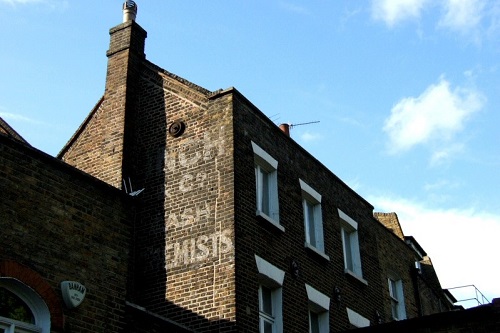Stef photo
By
Clive Collins
Depression, the doctor said, but Mary Alice thought the sadness that settled itself upon her for no good reason every autumn was more like the damp and chilly weather: something you just had to bear. It was only in the New Year, when she put away the Christmas tree and all the trimmings that she understood: understood it was thirty years now since her dad had died.
Her mam went first. Cancer that was, although nobody used the word until everything was over and done with. Mary Alice’s older sister Eileen looked after their mother at the end, their dad as well, because he couldn’t manage himself let alone a sick wife. Then, after the divorce from David and the three years she lived in the flat above the chemist’s shop in Gough Street, Mary Alice moved back in with her dad, sleeping in the room she’d had as a young girl. It wasn’t a perfect arrangement but one way or another it worked for them both. Mary Alice still helped Mr Bonsor, the chemist over whose shop she’d lived. He was considerably older than she was, but he was fond of her and there was even talk of marriage at one time. In the end though, Mary Alice said no.
Her dad had retired, you see, and being by himself all day in that empty house, well, he began to go downhill. He stopped shaving, wore the same shirt for days on end, lived on bits of toast and biscuits. “Something has to be done,” Mary Alice told her brother, Robert. But nothing was, so Mary Alice took on the responsibility herself.
To begin with she was round at her dad’s three days a week, then it was five and then seven. Finally, he said she might as well move back in because of the time she was spending with him. It was December when she went back home. The first night she was there she helped put up the Christmas tree and decorate it, something her dad hadn’t bothered with since losing Mary Alice’s mother.
Everyone made the effort to go home for Christmas Day that year, and it was the sort of Christmas Mary Alice remembered from when she was a little girl: the noise and excitement of the children, the unwrapping of presents, the women in the kitchen seeing to the dinner and later on the men at the sink making hard work of the washing up. That night, when Mary Alice and her dad were by themselves again, she made sandwiches with what was left of the turkey, the way her mother used to do on Christmas Night, and she and her dad sat across the fire from each other to eat them.
Mary Alice told her brother and sisters what their father had said to her then, about it being like the Christmases they used to have and how he had wept while trying to explain how much he had loved their mother and how he had missed her since she’d died.
It was the morning after Twelfth Night and Mary Alice was helping take down the tree when her dad said the thing that came back to her every year afterwards, the thing about how, having put away the tree and the trimmings, he wondered would he be there to see them again the next Christmas.
Talking about this to her brother or sisters, or to her friends if she saw them and the subject came up, Mary Alice would say something like, “I told him not to be so morbid. ‘Of course you’ll be here to see them again next year, Dad. Don’t be so daft.’”
And he was, but the following year he had his first stroke in the summer and the second one in early December. Even so, the hospital doctors were optimistic; but the next thing anybody knew he started pneumonia and that was that. “The old man’s friend,” one doctor told Mary Alice. She was on her own in the house then.
She went to Robert’s for Christmas that year, moving on to their Eileen’s for New Year’s Eve because, as Eileen said, Mary Alice wouldn’t want to be by herself that night, although in fact, it was precisely what she did want.
And the next year, although Eileen asked her for Christmas Day and Robert wanted her at his place on Saint Stephen’s Day, Mary Alice, ever so politely, said no. She thought her brother understood; Eileen didn’t. “Suit yourself,” was what Eileen said, and it was the last thing she did say to Mary Alice for a good while, although eventually she softened.
There were a lot of changes for Mary Alice in the years after her dad died. Mr Bonsor, the chemist who’d been sweet on her, retired and sold the business to a Mr and Mrs Chakrabati. They asked Mary Alice to stay on, but she wouldn’t. Standing all day long was getting to be more than she could manage, she said.
“Nonsense! You are still a young woman!” Mrs Chakrabarti told her.
Mary Alice smiled at that and said something about having a young, well, a middle-aged head, but very old feet. She did agree to help out for the first two months after the business changed hands, but made it clear she wanted to go after that, which she did.
She worried her brother and sisters. “I don’t how she stops in that house on her own all the time now she’s not working,” Maureen, who was the youngest, said to their Eileen. “It’s not like she has to. I’ve asked her to come out with me times. I said did she want to go to the pictures only last week. The answer’s always the same though, isn’t it?”
“I know,” Eileen said. “Now she did come for her tea once or twice not long after she packed in her job, but when I ask her now she serves me the same as she does you. I don’t understand it.”
“And another thing that’s a mystery to me is why she won’t have anything done to the house. I know our Robert’s offered to see to the redecorating and my Phil has said he’d get his firm to give her a really good price on a new kitchen and bathroom, but no, she won’t hear of it.”
“I know,” Eileen said again. “It’s like she wants to live that way. You know, keeping the place like it’s a mausoleum – do I mean mausoleum or do I mean museum? Either way, it’s a bit odd, a bit creepy.”
“It is. And, I don’t know if you’ve noticed when you’ve been round there with her, but when she wants the lavatory, she goes to the one outside rather than use upstairs. Now that is odd, I say. That is very odd.”
Robert was as concerned as his sisters. Talking to Eileen he told her how he had bumped into Mary Alice’s ex in a pub not long before. “He asked about her, you know. He told me he’s not with anybody now and I got the feeling he was trying to sound me out about Mary Alice. Do you think I should say anything?”
Robert did speak to his sister. She said she wasn’t interested, not in David or anybody else.
That was some years ago now as Mary Alice undresses the tree at the end of another Christmas. Those years have made further holes in the fabric of her life: Eileen, Robert’s wife Dolly, David, are all of them gone. Mary Alice slips into the kitchen to boil the water for a cup of tea, which she makes with a teabag in the cup these days, the old brown pot her dad and mam used being too heavy for her to lift. When the tea has strengthened to her liking she takes out the teabag, puts in milk and sugar and carries the cup back into the living room. It’s barely half-past two in the afternoon but the light is on above the table where she has the boxes sitting. She puts her tea down untasted for it will be far too hot to drink as yet. The tree is bare, the ornaments and the old paper decorations she still festoons the walls and ceiling of the sitting room with are already packed away. Mary Alice seals the boxes using last year’s tape, then wraps up the tree and wonders to herself whether she will ever unwrap it again, ever open up the boxes again. When she has put everything away in the cupboard under the stairs, she comes back into the living room, picks up her tea and goes to sit by the fire in her father’s chair.
Clive Collins
Born in Leicester, England, Clive Collins has spent the greater part of his life working as a teacher in Ireland, Sierra Leone, and Japan. He is the author of two novels, The Foreign Husband (Marion Boyars) and Sachiko’s Wedding (Marion Boyars/ Penguin Books). Misunderstandings, a collection of short stories, was joint-winner of the Macmillan Silver PEN Award in 1994. More recently his work has appeared in online journals such as Penny, Cecile’s Writers, Silver Birch Press, and terrain.org. He was a short-listed finalist in the 2009 Flannery O’Connor Award for Short Fiction. A chapbook of his short stories is forthcoming from Red Bird Chapbooks.



Again, many thanks for reading the piece, Maria, and for your kind words.
As always, a great story, Clive: sad, strong, poignant, thought-provoking, and so well written. Thank you for sharing.